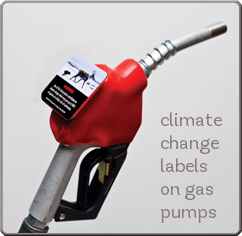Explore the Issues
Our #16yearsleft exhibition panels
The following is a web adaptation of our #16yearsleft exhibit. You can download a PDF version here or follow the links below. We recommend viewing them in order but feel free to skip to the panel that interests you most.
Panel 1) Only 16 years left?
The science is in – and it is unequivocal. Scientists now say that we haven’t seen this much carbon dioxide in our atmosphere in over 15 million years. We’re running out of time. Read more…
Panel 2) The effects of climate change
Over the course of a few generations and in the face of repeated warnings, we have changed the basic chemistry of our planet and endangered the survival and well-being of innumerable species. The effects of unmitigated climate change will be catastrophic. Read more…
Panel 3) A simple sticker
Municipalities can require gasoline retailers to put warning labels on gas pump nozzles like those on tobacco packages. Its placement on the nozzle takes a problem of diffuse origins and puts responsibility right in the palm of your hand. Read more…
Panel 4) A powerful idea
The image on the label addresses this by bringing far away consequences—like famine, the extinction of species and extreme weather—into the here and now. The label will change some behaviours but, more importantly, they will create a shift in our social environment to facilitate meaningful action on climate change. Read more…
Panel 5) How many kids per litre?
The warning label captures and communicates externalities in a qualitative way. It provides information to the marketplace and engages our humanity in a way that a 10-cent price increase never will. In doing so, it also challenges the prevailing economic view that actually requires us to price human suffering as pennies at the pump. Read more…
Panel 6) Adam Smith revisited
Adam Smith, revered by many as the founder of our economic system, argued that in order for the economy to function as it should, we must need feedback to engage our moral faculties. Unfortunately, much of our economy operates to disconnect us from the consequences of our decisions. The warning labels provide that moral feedback we’ve been missing. Read more…
Panel 7) Cars: A failure of imagination
The internal combustion engine is extremely inefficient, converting only about 20% of the chemical energy stored in gasoline into mechanical energy to power the wheels forward; much of the rest is lost to heat and exhaust. When you consider that you’re only a fraction of the total weight being moved, you’ll see that less than 1% of the gas that goes into your car is actually used to move you from A to B! Read more…
Panel 8) Cars: A century of stagnation
If we’re going to stop climate change, we’re going to need to re-think our prevailing mobility solutions. Did you know that a lot of cars on the road today have the exact same fuel economy as the Ford Model T released in 1908? Where most industries have innovated, the auto sector has stagnated for over a century. We are capable of much better. Read more…
Panel 9) Just like cigarettes
We have seen this play out before. The U.S. Congress required text warnings on cigarette packs a year after having heard conclusive science. Canada later required pictorial warnings. These efforts went global. Studies show that these labels are highly effective. Municipalities will lead the charge this time. Read more…
Panel 10) Can a few councillors make a difference?
Cities and towns have led before and they can lead again. Passing this by-law would create a global precedent. We’re counting on independent representatives from communities across Canada to stand on guard for Earth. Read more…











